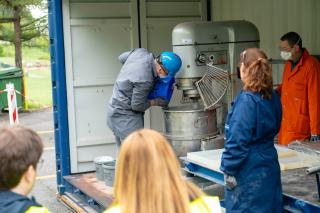Enhancing Mineral Security for Defence and Space Sovereignty
Enhancing Mineral Security for Defence and Space Sovereignty

By Annika Mulder, Vice President, Procurement Transversal and Space Systems Commodities, Airbus
Critical raw materials are essential for the aerospace and defence manufacturers. The most prominent feature of a satellite is its large solar panels, making raw materials such as silicon and gallium arsenide essential as they are necessary for the production of solar cells. Aircrafts need a significant amount of titanium due to the mineral’s lightweight properties. Aluminum and steel are also crucial, as they are used for various structural and mechanical components.
Not only do defence and aerospace manufacturers demand these materials, but they also require them to be of exceptionally high quality. The vacuum environment of space imposes unique demands on materials, and satellites must also endure extreme temperatures. Higher quality materials, such as solder alloys with fewer impurities, reduce the likelihood of internal stresses and chemical reactions that can lead to tin whisker formation, which can cause malfunctions. For the aerospace sector, aircraft security is even more critical, as a failure can result in fatal consequences.
Therefore, the stricter requirements and lower volumes of raw materials needed by these sectors put them in a difficult position during times of material scarcity. In the eyes of suppliers, these industries are small players compared to the automotive sector, which demands significantly larger volumes. Consequently, aerospace and defence manufacturers often face longer lead times and higher prices for raw materials.
Building a Resilient Supply Chain
These challenges must be addressed to enhance the resilience of the supply chains. At the “Heightening Minerals Security for Defence & Space Sovereignty” panel at the Raw Materials Summit in May, I highlighted three main pillars that are essential for achieving this goal: stability, sovereignty, and sustainability.
Stability
Stockpiling and anticipating needs are crucial. Airbus started building a strategic titanium stock from 2014 in order to de-risk its titanium supply because of the strong dependency on Russia. When sanctions on Russia were imposed following the invasion of Ukraine, the defence sector faced immediate impacts, highlighting the importance of such foresight.
Sovereignty
We need strategic planning at national, European, and international levels to ensure autonomy and reduce dependency on external sources. There is room for further optimisation in the way we collaborate across Europe, break down silos, and leverage our collective strength. As a unified entity, Europe can better address the aforementioned challenges than as individual countries or companies, especially when compared to powers such as the US or China.
Sustainability
Recycling and the circularity of materials are crucial to securing future raw materials supply and protecting our planet. Recently, traceability has become a key factor in ensuring supply chain sustainability. However, the conundrum lies in the fact that data is extremely sensitive in the defence context. Information related to a military aircraft cannot be simply uploaded to a cloud-based solution. Ensuring traceability and transparency while protecting data security is a delicate balance.
The current standards for recycling and circularity are predominantly set by the automotive industry, which requires lower quality for recycled raw materials than those needed in aerospace. At Airbus, we are working actively to find ways to lighten the requirements for recycled materials without compromising safety. This ensures that the recycled materials we use are flight-worthy while avoiding over-specification of standards.
In conclusion, the defence sector and aerospace manufacturers, which are not currently prioritised in the raw materials value chain, need more support. Addressing the sector’s unique challenges requires a multifaceted approach focusing on stability, sovereignty, sustainability, and enhanced collaboration. By doing so, we can build a more resilient and efficient supply chain capable of meeting the high demands of these critical industries during volatile geo-political situations.
Annika Mulder, Vice President of Procurement Transversal and Space Systems Commodities at Airbus, leads strategic procurement for a diverse scope of commodities across the Airbus Defence and Space businesses. This includes, amongst others, raw materials and electronic components. She is an Aerospace Engineer with more than 20 years of experience in various functional areas.
The Raw Materials Summit 2024 was organised by EIT Raw Materials, the world’s largest network in the raw materials sector. The next summit will take place on May 13-15, 2025, where topics such as sustainable and secure sourcing will be further explored.



